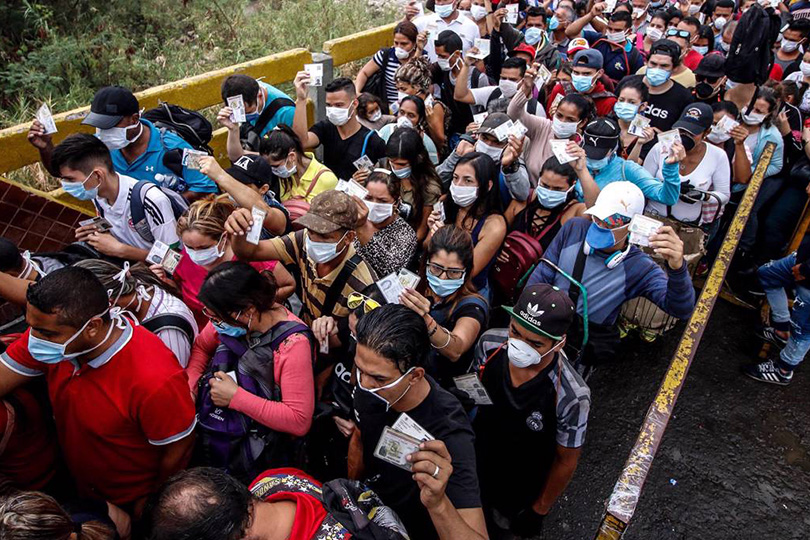COVID-19 has intensified our dependence on local communities, and we are riveted by stories of community resilience in the face of an unseen peril. But will we be able to think broadly and deeply enough to muster the commitment needed to confront the plight of distant strangers?
COVID-19 has renewed the significance of locality in our lives. Social isolation and, in many places, the limits of national authority have highlighted the importance of close-to-home resources and bottom-up solutions to an invisible menace. International trade and travel have brought the virus into our neighborhoods and workplaces, but regional and local health services have had to mobilize to contain the pandemic.
Not surprisingly, we are riveted by stories of community resilience in the face of an unseen peril. We observe this acuity and resourcefulness in the daily briefings of US state governors and see it in the forbearance of neighbors and the sacrifices of health-care workers. National figures? Not so much. We continue to tell ourselves, “The world is a dangerous place. Thank goodness for neighbors and local authorities and institutions.”
Yet the crisis we are facing is fundamentally global. If we breathe a sigh of relief as the contagion crests in China, France, or the United States, and resume our pre-pandemic lives, we won’t be prepared when the next outbreak occurs on distant shores. We cannot turn our backs on the destiny of people beyond our borders. If we do, the global health and economic crisis will become a moral crisis of globalization.
We may celebrate local and regional responses. But will we be able to think broadly and deeply enough to muster the commitment needed to confront the plight of distant strangers? Or will the pandemic and its economic fallout become an ethical minefield in which benighted self-interest is our only guide?
As the coronavirus spreads beyond the hubs of Asia, Europe, and North America, it will continue to push into new frontiers in Africa and Latin America, where testing and treatment are extremely limited in many areas. In Latin America, the world’s most unequal region, over 50,000 cases of COVID-19 have been confirmed so far, in a population of about 650 million. Africa has recorded only about 10,000 cases so far, in a population of 1.3 billion. These are open frontiers for COVID-19.
COVID-19 will plow through the least-prepared and most vulnerable of these societies. Making a bad situation worse, many have experienced rising political tension and instability during the past year.
These developing areas suffer from a combination of weak governance, extreme inequality (especially in big cities), and heightened migration. In the past decade, millions have fled violence and ecological pressures in epicenters like Honduras, the source of the “migrant caravans” that whipped US President Donald Trump into a xenophobic frenzy more than a year ago, and South Sudan, from which about 2.3 million refugees have fled to neighboring countries. These are not societies and regimes equipped to cope with a pandemic. Fleeing is the means to survive. But taking refuge elsewhere risks compounding the problem by exporting it.
If we don’t start thinking and acting now, the default solution will be to turn countries into mortuaries through a combination of barbed wire and border patrols. Consider Venezuela, where the authorities have confirmed only 189 cases – a number that few believe. Venezuela has long been suffering from severe institutional decomposition, becoming in recent years the Western Hemisphere’s worst humanitarian catastrophe. Inmates are starving in prisons. More than half of children under five years old are malnourished, 16% of them acutely so. Almost five million Venezuelans, about 15% of the population, have fled, mostly to neighboring countries.
As the coronavirus inevitably surges in Venezuela, the country’s chronic political crisis will cripple any effort to contain its spread or mitigate its effects. As with Africa’s weakest states, people will flee in droves, as they have already, causing a public health crisis in countries like Brazil and especially Colombia. The result will be a regionwide economic and humanitarian crisis.
But the problem is not limited to the likes of Venezuela and South Sudan. COVID-19 will hit all the world’s refugees hardest. Right now, there are officially 70 million – a number that does not include those displaced by climate change or other migrant populations. Nearly all of them lack access to government and civic resources that could protect them. By definition, they do not have access to the state and civic resources that have come to the rescue in Asia, Europe, and North America.
What will happen in refugee camps managed by the United Nations and NGOs, some of them on the scale of cities, that are already surrounded by barbed wire? And what will happen to the 46% of global refugees who do not live in camps, as in Jordan, South Africa, and Mexico, but who, because the host societies treat them as pariahs, don’t or can’t seek help from local authorities?
We can get ready. Global responses have been essential in stopping previous epidemics. Ebola first erupted in central Africa in 1976. In each outbreak, local health authorities and international experts joined forces to contain its spread. During the last major wave in West Africa in 2014-2016, President Barack Obama’s administration teamed up with the World Health Organization to support local efforts by providing protective equipment, relief supplies, and treatment units.
The challenge now is to prevent our resources from being over-extended, or even exhausted, by the time the disease ravages the global have-nots. Fortunately, we will also have learned what works and what doesn’t, and we will be stress-tested.
This is why we have to start preparing now, even as pundits and political leaders are eager to herald a return to normal. There will be no normal if we forsake the idea of humanity and turn our backs on strangers near and far.







Comments